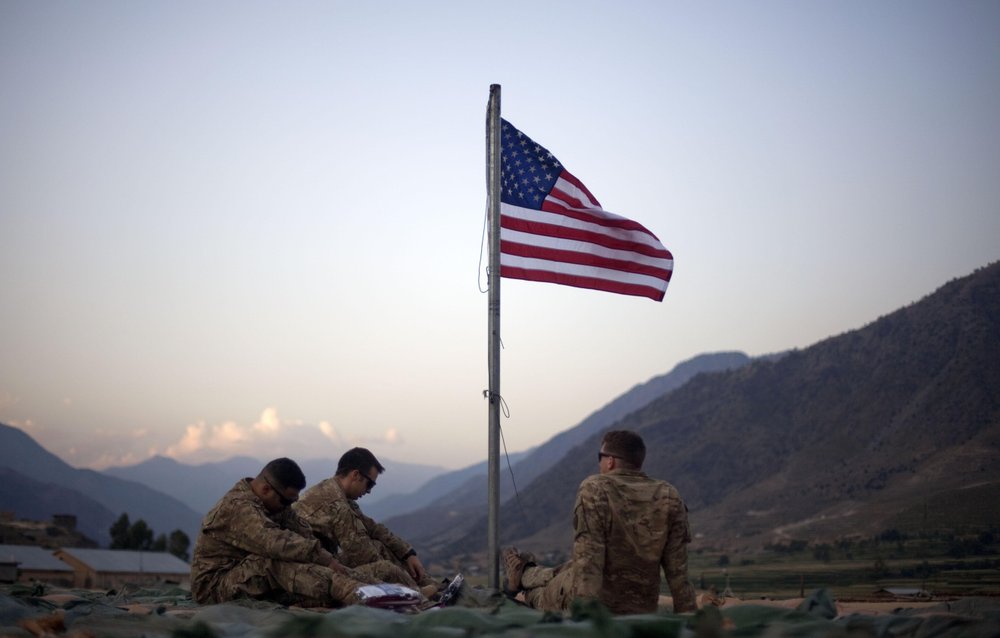
Hubris comes in many forms, but surely the rushed exit of American forces from Afghanistan to meet an artificial political deadline of the 20th anniversary of the September 11 attacks in the US is a breathtaking example.
Rather than strengthening the agents of reform in Afghanistan, upon which the US and its allies have inefficiently spent trillions of dollars, this helter-skelter exit has undermined them, leaving at the mercy of a resurgent Taliban.
Now, rather than affording President Joe Biden an opportunity to claim that the sacrifices of western militaries and aid agencies in Afghanistan were worth the struggle, the September 11 anniversary will be marked by mealy mouthed explanations of what was clearly a self-inflicted policy disaster.
It is so different from the reaction to the attacks of 20 years ago, when Al Qaeda’s attack on America directly killed 2,977 people and pushed the US government into its War on Terrorism, which has killed many, many more worldwide.
Afghanistan, of course, which under the Taliban government of 1996-2001 had welcomed Al Qaeda to its soil, was the first military target of the US’s response. And at the time, the world, shocked by the attacks on New York and Washington DC, was largely supportive of the American action.
The Taliban were swiftly toppled, of course, and replaced by a government that was pro-western and, in theory, if not in practice, supportive of free and fair elections.
But move on 20 years, and the failure of this nation building policy, which Biden now denies was a goal (despite having supported it publicly in the past), is clear to all. Yes, the Taliban gained support from Pakistan and other external actors, but if a clean inclusive and efficient government that commanded the heartfelt loyalties of Afghans had been forged, it is highly doubtful that the Taliban would be back in power today.
It may not be removed as quickly this time. The Taliban has learned. It has portrayed itself as “biting its fingers of regret” for supporting Al Qaeda at the beginning of the millennium, causing the entry of US forces and the International Security Assistance Force in Afghanistan (ISAF), subsequently replaced, after training, by the ‘Resolute Support Mission’ of backing the ousted Afghan government, which has just been resolutely withdrawn.
Also, the Taliban knew they were going to win and have time to prepare factions for power. The agreement with the US government, under President Donald Trump, excluded the Afghan government that had benefited from vast American largesse.
Pressure from outside Afghanistan to fight the Taliban will not emerge quickly, if at all. The decision to quit Afghanistan was widely supported across American decision-makers and US allies in Europe. Statements have stressed the possibility of establishing diplomatic relations with the Taliban, giving it international legitimacy as a government and underlining its apparent transformation from a terrorist movement to representative of an entire country. The European Union’s high representative for foreign affairs Josep Borrell had noted that relations were needed with the Taliban, given they had been “victorious in the war” – a radical change in the official policy posited by the Biden administration, which officially wanted a negotiated solution between the Afghan government and the resurgent Taliban.
This diplomacy has of course been complicated by the race between China, Russia and Turkey for dialogue with the Taliban, provided that the movement announces appropriate plans for managing the country with a modicum of efficiency.
For Americans who fought and worked in Afghanistan over the past 20 years, this precipitous withdrawal and collapse of institutions they struggled (often imperfectly) to create and defend, must be a sucker punch to the gut. As of April, there were 2,448 American military service members killed in Afghanistan since 2001, 3,846 US contractors, and 66,000 Afghan national military and police. While it may be a low death toll by many 20th century war standards, it is still a lot of blood.
And while the American withdrawal from Afghanistan, or from any American war abroad, especially in the Middle East, is undoubtedly politically popular among US voters, the chaos of the Afghan government’s collapse and the swift seizure of power by the Taliban has prompted criticism and undermined respect for President Biden at home (and abroad). The failure of the withdrawal is clear for all to see.
So, on the 20th anniversary of 9/11, we can expect Biden to provide mostly anodyne answers to questions about Afghanistan. He will say he does not trust the Taliban (so no diplomatic recognition of its government), but he will stress the Taliban has changed and no longer poses a direct threat to American national security.
Think tanks, politicians, specialists, researchers and the media will probably assist Biden by redirecting public attention to the Russian danger to America’s national security and the Chinese danger to its economic security.
But what if the Taliban’s promises not to harbor extremist terrorists in Afghanistan are broken? I fear Taliban extremism, which has not been addressed for 20 years, has not just remained, but American intervention may have increased its edge. We may then witness a new 9/11 in any part of the world, with Afghanistan lending a hand – a hit to Biden’s reputation that would be severe indeed.
And even if the Taliban proves to be more moderate and focuses on Afghan interests alone – that may include forging good relations with its neighbors and American rivals Russia, China, and Turkey. That too will be a strategic failure for American diplomacy.
These problems may not come to pass, and it is maybe too early to label the withdrawal decision as a strategic failure. But it will prevent President Biden from claiming the reaction to September 11, upon its 20th anniversary, have been victorious.
If the exit of American military forces from Afghanistan were intended to carry a certain symbolism, it has failed in that completely. Instead, the world sees America as having abandoned the Afghan people to aid the Taliban.
Expounding upon the new US policy, Biden has said: “We have developed a cross-border counterterrorism capability that will allow us to keep our eyes fixed on any direct threats to the United States in the region, and to act quickly and decisively if necessary.” This will mean that the United States will strike any future threats from afar. That makes sense given the continued strength of American military forces. But Biden did not explain how the withdrawal of US forces from Afghanistan would help implement this policy, especially as a Taliban government recruits new supporters, intimidates its opponents, and consolidates its power.
Maybe the US administration is fully aware of what it is doing, and Biden and his team may have new cards to play or secret agreements to which we are not privy that can leverage good behavior by the Taliban. Maybe the decision to withdraw may carry positive results for America in the long term and improve its ability to maintain its security.
But one inescapable fact is that this poorly planned withdrawal has been a blatantly callous display of pragmatism in politics, one that highlighted selfishness by an American Republic that likes to project the value of democracy and the protection of human rights. The Afghans fleeing their country or risking violence by demonstrating against the Taliban are a living witness to this. And if the whole world sympathized with the Americans on September 11, 2001, today few global citizens – including Americans – are sympathetic to Biden’s decision to pull out of Afghanistan hastily to meet a self-interested political deadline. This was always going to be a risky move and it is difficult to speculate about the reasons for Biden’s decision to link withdrawal to the deadliest attack on American soil.
Suffice to say, it was a mistake.
The consequences will emerge later.




